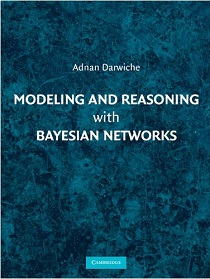Hardcover: 560 pages
Publisher: Cambridge University Press; 1st edition (April 6, 2009)
Language: English
ISBN-10: 0521884381
ISBN-13: 978-0521884389
eBook Description:
Modeling and Reasoning with Bayesian Networks
This book provides a thorough introduction to the formal foundations and practical applications of Bayesian networks. It provides an extensive discussion of techniques for building Bayesian networks that model real-world situations, including techniques for synthesizing models from design, learning models from data, and debugging models using sensitivity analysis. It also treats exact and approximate inference
algorithms at both theoretical and practical levels. The author assumes very little background on the covered subjects, supplying in-depth discussions for theoretically inclined readers and enough practical details to provide an algorithmic cookbook for the system developer.
A thorough introduction to the formal foundations and practical applications of Bayesian networks. It provides an extensive discussion of techniques for building Bayesian networks that model real-world situations, including techniques for synthesizing models from design, learning models from data, and debugging models using sensitivity analysis. It also treats exact and approximate inference algorithms at both theoretical and practical levels. The treatment of exact algorithms covers the main inference paradigms based on elimination and conditioning and includes advanced methods for compiling Bayesian networks, time-space tradeoffs, and exploiting local structure of massively connected networks. The treatment of approximate algorithms covers the main inference paradigms based on sampling and optimization and includes influential algorithms such as importance sampling, MCMC, and belief propagation. The author assumes very little background on the covered subjects, supplying in-depth discussions for theoretically inclined readers and enough practical details to provide an algorithmic cookbook for the system developer.
Review
“Bayesian networks are as important to AI and machine learning as Boolean circuits are to computer science. Adnan Darwiche is a leading expert in this area and this book provides a superb introduction to both theory and practice, with much useful material not found elsewhere.” Stuart Russell, University of California, Berkeley
“Bayesian networks have revolutionized AI. This book gives a clear and insightful overview of what we have learnt in 25 years of research, by one of the leading researchers. It is both accessible and deep, making it essential reading for both beginning students and advanced researchers.” David Poole, Professor of Computer Science University of British Columbia
“Bayesian Networks are models for representing and using probabilistic knowledge, introduced in the field of Artificial Intelligence by Judea Pearl back in the 1980′s. Since then many inference methods, learning algorithms, and applications of Bayesian Networks have been developed, tested, and deployed, making Bayesian Networks into a solid and established framework for reasoning with uncertain information. Adnan Darwiche, a leading researcher in the field, has produced a book that provides a clear, coherent, and advanced introduction to Bayesian Networks that will appeal to students, practitioners, and scientists alike. A wonderful exposition that starts with propositional logic and probability calculus, and ends with state-of-the-art inference methods and learning algorithms. In my view, the best book on Bayesian Networks since Pearl’s seminal book.” Hector Geffner, ICREA and Universitat Pompeu Fabra
“The book is both practical and advanced… The book should definitely be in the bookshelf of everyone who teaches Bayesian networks and builds probabilistic reasoning agents.” Yang Xiang, Artificial Intelligence
Features
Assumes very little background, making it ideal for students and researchers new to the field
Extensive coverage of modelling techniques and algorithms for both exact and approximate inference
In-depth treatment of the underlying theory, perfect as a springboard for further research
A thorough introduction to the formal foundations and practical applications of Bayesian networks. It provides an extensive discussion of techniques for building Bayesian networks that model real-world situations, including techniques for synthesizing models from design, learning models from data, and debugging models using sensitivity analysis. It also treats exact and approximate inference algorithms at both theoretical and practical levels. The treatment of exact algorithms covers the main inference paradigms based on elimination and conditioning and includes advanced methods for compiling Bayesian networks, time-space tradeoffs, and exploiting local structure of massively connected networks. The treatment of approximate algorithms covers the main inference paradigms based on sampling and optimization and includes influential algorithms such as importance sampling, MCMC, and belief propagation. The author assumes very little background on the covered subjects, supplying in-depth discussions for theoretically inclined readers and enough practical details to provide an algorithmic cookbook for the system developer.


Comments
Post a Comment